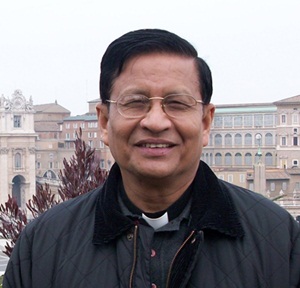Archbishop calls refugees back to Burma

Burma's three million refugees should return home and help rebuild their nation, according to the leader of the country's Catholics, who says that after half a century times are changing for the better.
Stressing the "light of hope that is slowly starting", Archbishop Charles Bo of Yangon, formerly called Rangoon, said that 50 years after the military junta seized power in Burma, "the opportunity" has come for the country's massive exiled community to "come back to their motherland".
The appeal – which was also made to the country's one million internally displaced people – was among a series of calls by the archbishop directed at key sections of society and government aimed at restoring the people's human rights.
The message, a copy of which was sent to Catholic charity Aid to the Church in Need, marked the 50th anniversary of the 1962 coup d'état which brought the junta to power and saw the country renamed Myanmar.
Archbishop Bo's message comes amid widespread change in Burma.
A nominally civilian government was installed in March 2011, a few months after the release of pro-democracy campaigner Aung Sang Suu Kyi. Last November US President Barack Obama paid a landmark visit to the country.
In his message, a Christmas homily, the archbishop called for the release of "political prisoners" jailed abroad and said the people's debts should be cancelled, describing Burma as "a nation on a loan, despite our resources".
He appealed for an end to internal conflict, saying that thousands had died in "senseless" violence and he went on to call for efforts towards reconciliation, saying that justice and peace were both vital.
The message stated: "We are a refugee nation, we are a displaced nation.
"More than three million people are outside our country without proper papers… most of them are living in hiding, living an inhuman life.
"Some of them have not seen their family in decades. Our sons and daughters must come back to their motherland."
Calling for a renewal of confidence, he said: "[50] years of suffering are slowly giving way to hope.
"The message is the message of empowering the weak, the vulnerable and the marginalised."
He highlighted the country's long period of suffering, stating that in 1962 "a darkness engulfed" the country: "[Burma's] history was frozen, her beauty was hidden, her sons and daughters were literally taken to the slavery of silence, many to martyrdom, many to long nights of silent tears.
"Millions became displaced, millions became illegal migrants eking out an inhuman life in modern forms of slavery."
But now, he said, there was change: "After 50 years, we have come together as a people who have walked in the darkness to see the light.
"The light of truth that shines on us, the light of freedom whose streaks are slowly waking our people, the light of opportunities that is slowly emerging… the light of hope is slowly starting.
"Our journey is long – but hope is the spring that flows gently in our golden land. Praise be to God. Thanks to men and women who made that happen."











